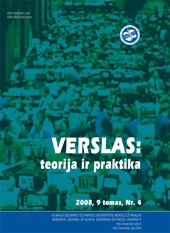Išlaidų ir naudos analizės taikymo galimybės valstybės priimamoms reguliavimo priemonėms vertinti
Possibilities of Using the Cost-Benefit Analysis for the Evaluation of the Government Regulation Measures
Author(s): Romualdas Ginevičius, Šarūnas BruzgėSubject(s): Economy
Published by: Vilnius Gediminas Technical University
Keywords: Regulating measures of the government; market; decisions; impact; evaluation; cost-benefit analysis.
Summary/Abstract: In today’s economy the main market factors are self-regulated by the market. Despite that, the government role in economics is still substantial and the market most probably can not exist without it. In situations when the market itself can not quickly and effectively respond to problems for the benefit of the society the government still have to take the leading role. However, decisions on the regulating measures to be implemented have to be made with care and thoroughly evaluated in advance. The current methodology on the evaluation of regulating measures imposed by the government of Lithuania does not ensure transparent and thorough evaluation of the regulating measures. The article reviews foreign practice and examines the possibilities of using the cost-benefit analysis (used world-wide for the evaluation of investment projects) for governments for the evaluation of the regulation measures to be implemented. Specific features of the cost-benefit analysis are examined and the specific needs of evaluation of the regulation measures are being addressed. The hypothetical example of application of the methodology is presented. The conclusions are drawn at the end - the cost-benefit analysis even though having some drawbacks is found to be able to significantly improve the quality of the analysis of possible impact of the implementation of regulating measures.
Journal: Verslas: teorija ir praktika
- Issue Year: 2008
- Issue No: 3
- Page Range: 180-189
- Page Count: 10
- Language: Lithuanian

